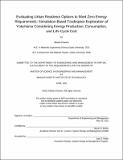Evaluating Urban Residence Options to Meet Zero Energy Requirements: Simulation-Based Tradespace Exploration of Yokohama Considering Energy Production, Consumption, and Life-Cycle Cost
Author(s)
Kawano, Masato
DownloadThesis PDF (3.415Mb)
Advisor
Bryan R. Moser
Terms of use
Metadata
Show full item recordAbstract
Most countries have announced ambitious decarbonization goals towards 2050. The Japanese government has declared a target to reduce CO2 emission by 46% from 2013 and taken on the challenge of reaching a height of 50%. Following this declaration, local governments are also considering specific plans for decarbonization. Among them, the City of Yokohama plays a leading role as the chairman of the local government. Yokohama has announced a renewable energy utilization strategy and is calling for dialogue on future issues. The purpose of this research is to clarify the future issues of the energy system of the City of Yokohama. The target is the household sector, and a house is regarded as a complex system in this paper. The systems approach explored the optimal system architecture. Stakeholder analysis confirms that Prosumers will be essential players in future energy systems. The owner of a decarbonized home system will be the Prosumer. To make the best architectural decisions, 360 concepts were defined and were simulated the performance of each concept: energy consumption and production. As an evaluation of economic efficiency, the payback period was calculated from the life cycle cost of each concept. Tradespaces based on performance and payback period were explored. As a result, it was found that the payback period is shortened (ten years can be seen), and the system performance is improved in the case where the PV capacity is large. The results of this research recommend installing PV as much as possible, while a cogeneration system is not recommended due to consumption of much gas. To further shorten the payback period, it is better to use a third-party-owned scheme. Although simulations show that the energy efficiency performance of electric and non-electric houses is comparable, non-electric houses use gas, so unless carbon-neutral gas is available, a new non-electric house is not recommended to achieve the decarbonization goal.
Date issued
2021-06Department
System Design and Management Program.Publisher
Massachusetts Institute of Technology